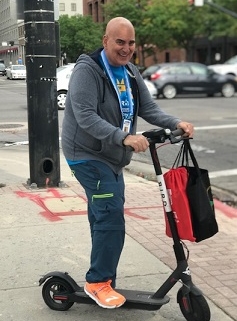From Fatty Liver to Sassy Liver
June 2022:
On April 5, 2017, Jerry Rosenberg of Jacksonville, Fla., boarded a cruise ship in Ft. Lauderdale with his cousin. Jerry loved to cruise and was headed first to Bermuda, then to Ireland, England and France.
Their departure from the port was delayed by five hours due to a bogus bomb threat, but once underway, Jerry went to the ship’s buffet for a late dinner, a simple act that forever changed his life.
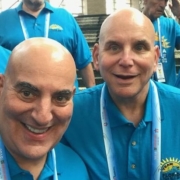
Jerry and AJ at the Transplant Games in Salt Lake City, Utah.
Jerry got food poisoning that night, and the following morning he visited the ship’s sick bay.
“I remember going to the infirmary on Thursday,” Jerry said. “They had me call my brother and tell him they were making me get off the ship in Bermuda on Sunday. He said he would come and help me get home.”
The next thing Jerry remembers was hearing the thump-thump-thump of the air ambulance on which he was a passenger. He slipped into a coma while at a hospital in Bermuda and was being air-lifted to the Cleveland Clinic back in Florida. By now it was Tuesday.
“I had been in a coma all this time,” Jerry said. “No one really knew what was wrong with me, and the only place that would accept me at the time was the Cleveland Clinic in Weston, Florida.”
“I didn’t realize the food had been sitting out for five hours waiting for us to be cleared to leave, and I ate something which gave me food poisoning,” he said.
Within hours of arriving at the Cleveland Clinic, doctors discovered that Jerry had a nonalcoholic fatty liver which was unable to filter the noxious bacteria found in the food he had eaten on the ship. Fatty liver occurs when fat accumulation is more than five percent of the liver weight. The fat starts to invade the liver, gradually infiltrating the healthy liver areas so that less and less healthy liver tissue remains.
Despite his dire physical condition, it never crossed Jerry’s mind that he might need a new liver to survive.
“I thought the liver would rejuvenate itself, and I would do everything I could to be healthy,” he said. “My mind started changing a few days later when I received a phone call from a close friend telling me that six of his friends had had liver transplants and all had done beautifully. He made me promise him I would do everything I could to get a liver transplant to save my life.”
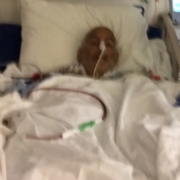
Doctors in Bermuda gave Jerry less than one percent chance of surviving an airlift.
Jerry left Cleveland Clinic with his brother, AJ, who drove him straight to the Mayo Clinic Hospital in Jacksonville. On May 7, 2017, Jerry received his “sassy” new liver.
“It was the best decision of my life,” he said. “I didn’t even realize I had had a liver transplant until my brother told me the next day. That’s how sick I was.”
Following his transplant and before taking on the world again, Jerry spent seven weeks recovering and rehabilitating at the Mayo Clinic and then at a nursing facility. He was on his road to recovery.
Back to his former self now, Jerry seizes every opportunity to engage others and share his Gift-of-Life story with members of his Jewish faith and the LGBTQ community. Jerry co-owned the Metro Entertainment Complex in Jacksonville for 28 years. It was the largest gay nightclub in the southeast before permanently shutting its doors in August 2021, brought down by the pandemic.
“So many LGBTQ people are organ donors because they just feel that is the right thing to do,” he said. “Physically, mentally, spiritually, religiously — they just think it’s the right thing to do.”
In this case, Jerry’s faith and friendships coincide. He said his Rabbi recently delivered a rousing message about organ donation that inspired him.
“He said the last thing you can do is give life to others. It is the greatest gift you can give,” Jerry said. “I just thought that was great.”
Now that he is retired, Jerry attends two support groups at the Mayo Clinic and volunteers with Big Brothers Big Sisters of America. Twice he has competed in the Transplant Games of America, where thousands of transplant recipients and living donors from around the world contend in athletic and recreational events.
“This was a huge challenge for me, and I am proud to say that I have met some of the best people in the world who have been through a lot of the same challenges I’ve been through,” he said.
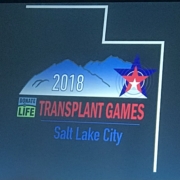
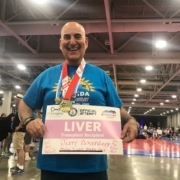



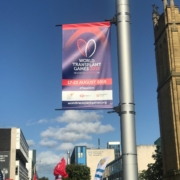
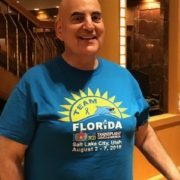
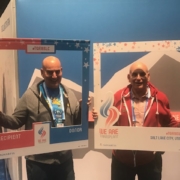
Adding to his list of accomplishments, Jerry’s team won a gold medal in bowling at the 2018 Transplant Games in Salt Lake City, Utah, and he helped set a Guinness World Record for largest gathering of organ transplant recipients — 540. He also participated in letter-writing workshops to help him find the right words to connect with his organ donor’s family. He has written them twice but has not heard back yet.
“White. Black. Male. Female. At the moment, I know nothing about my donor,” he said.
Even so, Jerry lovingly speculates the donor of his “sassy” liver may be a woman, because soon after his transplant unusual desires and cravings emerged. Most notably, he wanted to get a pedicure.

AJ caring for Jerry after his liver transplant.
“I went to the mall and got a pedicure, and that’s not like me,” he said.
He also developed a hankering for crab legs drenched in butter.
Looking ahead, Jerry plans to attend the Transplant Games in San Diego, Calif., only this time he will serve as a helper instead of competing in events.
“Life is wonderful now,” Jerry said. “Other than lots of medications every day, frequent blood work and testing, things are back to normal. I thank God every day when I wake up for this opportunity of a second chance.”
Life came full circle in May when Jerry boarded a cruise to Bermuda, of all places. His brother and now his caregiver, AJ, came along.
“I love cruising. I love the life. I love karaoke and hearing people sing,” Jerry said. “This pilgrimage was very important to me. My brother and I always step up and talk to people about organ donation. We told everyone on the cruise.”
While in Bermuda, the brothers visited with staff and healthcare workers at the hospital where Jerry was initially treated for his food poisoning while unconscious. They posed for pictures and delivered a simple message.
“Thank you for taking care of me,” Jerry told them. “Thank you so much for saving my life.”
By Kim Gilmore, Sr. Public Education Coordinator

